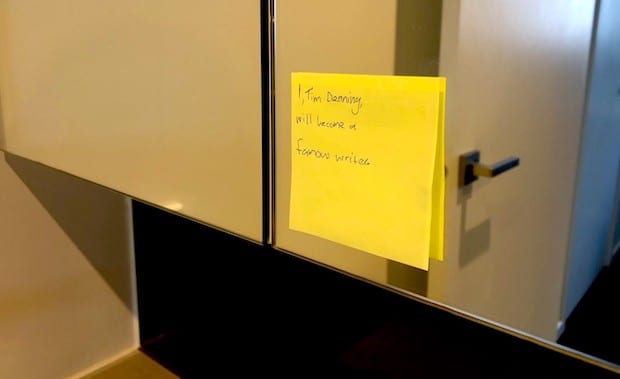Life
Life’s Toughest Questions After Seeing Tim Ferriss Turn 40

Recently, Tim Ferriss turned 40. Many think of him as the ultimate form of success.
His life is not as rosy as you may think. After one particular episode of his podcast, he admitted to turning 40 and trying to answer life’s toughest questions. With all of his wisdom and success, he still has the same challenges trying to answer life’s biggest questions.
To solve this challenge, he started emailing these tough questions to people he thought were the smartest in the world at life. While I don’t know the result, I know I’ve struggled with the same questions as Mr. Ferriss.
No one prepares you for life and these tough questions that we all face surround even the most successful people. This was a real “lightbulb” moment for me when I realized that Tim Ferriss, and others, suffer from the same questions that I find hard to answer.
So let’s explore these questions, so we’re all on the same page.
Am I no longer young anymore?
Tim Ferriss has certainly brought up this one a bit. Now he’s 40 he’s no longer in his 20’s or 30’s which officially makes him a grown man in many cultures.
What I’ve learned about my own age is that I felt like an old man at 21 and feel like a teenager now that I’m a bit older. Age is determined by how you feel. I do think, though, that we all get to an age where our conscious and subconscious minds align and realize that life doesn’t last forever.
Tim appears to have finally reached this point and that’s why he’s asked the questions that follow this one. He’s at a point where these questions can no longer be ignored or taken as something to address later in life. That’s what age can do to you. This happens to all of us at different times in our life.
Don’t fear these questions. Use them as motivation.
Will I ever find my one true passion?
Just like with my blogging, Tim Ferriss has many pursuits himself. With only one life, it’s difficult not to consider whether this one pursuit that has got you where you are will be your last. For many of us, it will. For some, we may change paths.
I think this question is near impossible to answer. All I’ve learned is that you must do what you love and make it a passion. You have to become consciously aware of at least one thing you can invest your time into. Without even trying to find a passion, there’s a strong chance you’ll never get close.
Sometimes our passion is hidden. Like mine for example; I love inspiring people and have used music, blogging and even video to deliver my passion. Look a little deeper and you may find that all of your pursuits center around one particular theme (mines inspiring others) – that’s your passion.
Is this person my life partner?
Now that Tim’s 40 he’s definitely talking a lot more about finding a partner and even kids. Until he turned 40, these themes were somewhat ignored from his popular podcast or glossed over. When you realize that you can’t live forever, you start to think about three things:
1. Do I want a life partner?
2. Is the person I’m currently seeing my life partner?
3. Do I realize there could be multiple life partners in my life?
The reality is that even if you find a life partner, they could die, divorce you or even cheat on you. Nothing is for life. With that said, I think it’s healthy to at least try and find a life partner otherwise you may live to regret it later on.
“You have to decide whether a life partner works for your model of the world. For many of you, you’ll find it will”
Do I want kids and how will it change my life?
This one’s been mentioned a few times by Tim and I don’t think he knows the answer yet.
“The challenge is tossing up between the commitment kids take versus the legacy you want to leave”
I never thought I wanted kids but I think if I left this world without any physical human legacy, I’d feel like I hadn’t tried everything life has to offer. Everyone I know that has had kids describes it as a feeling you can’t explain. This is a question you need to contemplate.
This question is one of life’s biggest ones and many people (including Tim Ferriss) haven’t answered it yet. Unfortunately, at some stage, this question must be answered with a yes or a no.
How will I deal with sickness or death?
As Tim has gotten older and recently turned 40, he’s experienced what it’s like to have people close to him die. People can die at any age but this reality becomes more apparent as you get older. Each time someone passes away, you’re reminded of your own mortality.
With each death, you have a choice to make: will you use death as a motivator or will you let it make you sad and remind you of your mortality?
Dealing with death hasn’t been easy for Tim and I suspect it’s the same for everyone. We all have to find a way to move on in life when tragedy or sickness takes someone we love.
What does success really mean to me?
If you think about all the success Tim Ferriss has had, this question is something he clearly ponders a lot. When you’re at the top of the mountain, it’s not all that hard to forget how challenging it was to get there.
I think Tim is still defining what success means to him and I believe he has at least realized it has nothing to do with podcast downloads, books sold or money in the bank. All of us need to at least get to this level at some stage in our life. Defining what success is beyond these mediocre metrics is the mysterious puzzle to solve. Luckily puzzles are fun and intriguing.
“Based on what I’ve seen of Tim, I think the one thing he hasn’t mastered is how he can mentor others beyond his podcast and books”
While his podcast and books help us all greatly, deep down, Tim knows that it also tickles the fetish he has for experimentation and talking to leaders.
Doing something solely for the purpose of helping others and having no real personal gain is the next level. I’m not there yet either and I think we all arrive there at some point. Both Tim and I will hopefully discover this feeling later in life before we leave this world.
I’d love you to discover this same concept of success for yourself too.
So what do you do now with these questions?
We’ve come a long way in a relatively small number of words. This post is designed to point out these questions, so you don’t lose sight of them.
I may have presented more questions than answers and that’s okay.
Here are some answers to these questions to ponder:
– There’s a high chance there isn’t one of anything.
– You’ll know when something feels right. Trust your judgment.
– What you value could be very different to everyone else and that’s cool.
Tim Ferris, myself, and anyone else you may follow all have the same questions to ponder. If you realize that after reading this at the very least, then my job is done. If you didn’t, then read this blog post again.
Everyone you meet in life is having their own battle with these life questions. These questions create fear, sadness, awareness and happiness all at the same time.
These life questions are the meaning of your life. I’ve just given you the most difficult challenge you’ll ever face in life and only just come to terms with that. It’s okay though – someone has to be the messenger.
Answer these questions above and you’ll know what life means to you. Good luck!
If you want to increase your productivity and learn some more valuable life hacks, then join my private mailing list on timdenning.net
Did You Know
How Skilled Migrants Are Building Successful Careers After Moving Countries
Behind every successful skilled migrant career is a mix of resilience, strategy, and navigating systems built for locals.

Moving to a new country for work is exciting, but it can also be unnerving. Skilled migrants leave behind familiar systems, networks, and support to pursue better job opportunities and a better future for their families. (more…)
Life
10 Research-Backed Steps to Create Real Change This New Year
This New Year could finally be the one where you break old patterns and create real, lasting change.

Every New Year, we make plans and set goals, but often repeat old patterns. (more…)
Life
9 Harsh Truths Every Young Man Must Face to Succeed in the Modern World
Before chasing success, every young man needs to face these 9 brutal realities shaping masculinity in the modern world.

Many young men today quietly battle depression, loneliness, and a sense of confusion about who they’re meant to be.
Some blame the lack of deep friendships or romantic relationships. Others feel lost in a digital world that often labels traditional masculinity as “toxic.”
But the truth is this: becoming a man in the modern age takes more than just surviving. It takes resilience, direction, and a willingness to grow even when no one’s watching.
Success doesn’t arrive by accident or luck. It’s built on discipline, sacrifice, and consistency.
Here are 9 harsh truths every young man should know if he wants to thrive, not just survive, in the digital age.
1. Never Use Your Illness as an Excuse
As Dr. Jordan B. Peterson often says, successful people don’t complain; they act.
Your illness, hardship, or struggle shouldn’t define your limits; it should define your motivation. Rest when you must, but always get back up and keep building your dreams. Motivation doesn’t appear magically. It comes after you take action.
Here are five key lessons I’ve learned from Dr. Peterson:
-
Learn to write clearly; clarity of thought makes you dangerous.
-
Read quality literature in your free time.
-
Nurture a strong relationship with your family.
-
Share your ideas publicly; your voice matters.
-
Become a “monster”, powerful, but disciplined enough to control it.
The best leaders and thinkers are grounded. They welcome criticism, adapt quickly, and keep moving forward no matter what.
2. You Can’t Please Everyone And That’s Okay
You don’t need a crowd of people to feel fulfilled. You need a few friends who genuinely accept you for who you are.
If your circle doesn’t bring out your best, it’s okay to walk away. Solitude can be a powerful teacher. It gives you space to understand what you truly want from life. Remember, successful men aren’t people-pleasers; they’re purpose-driven.
3. You Can Control the Process, Not the Outcome
Especially in creative work, writing, business, or content creation, you control effort, not results.
You might publish two articles a day, but you can’t dictate which one will go viral. Focus on mastery, not metrics. Many great writers toiled for years in obscurity before anyone noticed them. Rejection, criticism, and indifference are all part of the path.
The best creators focus on storytelling, not applause.
4. Rejection Is Never Personal
Rejection doesn’t mean you’re unworthy. It simply means your offer, idea, or timing didn’t align.
Every successful person has faced rejection repeatedly. What separates them is persistence and perspective. They see rejection as feedback, not failure. The faster you learn that truth, the faster you’ll grow.
5. Women Value Comfort and Security
Understanding women requires maturity and empathy.
Through books, lectures, and personal growth, I’ve learned that most women desire a man who is grounded, intelligent, confident, emotionally stable, and consistent. Some want humor, others intellect, but nearly all want to feel safe and supported.
Instead of chasing attention, work on self-improvement. Build competence and confidence, and the rest will follow naturally.
6. There’s No Such Thing as Failure, Only Lessons
A powerful lesson from Neuro-Linguistic Programming: failure only exists when you stop trying.
Every mistake brings data. Every setback builds wisdom. The most successful men aren’t fearless. They’ve simply learned to act despite fear.
Be proud of your scars. They’re proof you were brave enough to try.
7. Public Speaking Is an Art Form
Public speaking is one of the most valuable and underrated skills a man can master.
It’s not about perfection; it’s about connection. The best speakers tell stories, inspire confidence, and make people feel seen. They research deeply, speak honestly, and practice relentlessly.
If you can speak well, you can lead, sell, teach, and inspire. Start small, practice at work, in class, or even in front of a mirror, and watch your confidence skyrocket.
8. Teaching Is Leadership in Disguise
Great teachers are not just knowledgeable. They’re brave, compassionate, and disciplined.
Teaching forces you to articulate what you know, and in doing so, you master it at a deeper level. Whether you’re mentoring a peer, leading a team, or sharing insights online, teaching refines your purpose.
Lifelong learners become lifelong leaders.
9. Study Human Nature to Achieve Your Dreams
One of the toughest lessons to accept: most people are self-interested.
That’s not cynicism, it’s human nature. Understanding this helps you navigate relationships, business, and communication more effectively.
Everyone has a darker side, but successful people learn to channel theirs productively into discipline, creativity, and drive.
Psychology isn’t just theory; it’s a toolkit. Learn how people think, act, and decide, and you’ll know how to lead them, influence them, and even understand yourself better.
Final Thoughts
The digital age offers endless opportunities, but only to those who are willing to take responsibility, confront discomfort, and keep improving.
Becoming a man today means embracing the hard truths most avoid.
Because at the end of the day, success isn’t about luck. It’s about who you become when life tests you the most.
Change Your Mindset
The Four Types of Happiness: Which One Are You Living In?
Most people chase success only to find emptiness, this model reveals why true happiness lies somewhere else.

In a world driven by rapid technological growth and constant competition, many people unknowingly trade joy for achievement. (more…)
-

 News3 weeks ago
News3 weeks agoBrandon Willington Builds 7-Figure Business by Ignoring Almost Everything
-

 Health & Fitness4 weeks ago
Health & Fitness4 weeks agoWhat Minimalism Actually Means for Your Wellness Choices
-

 Did You Know4 weeks ago
Did You Know4 weeks agoWhy Most Online Courses Fail and How to Fix Them
-

 Business4 weeks ago
Business4 weeks agoIf Your Business Internet Keeps Letting You Down, Read This
-

 Business2 weeks ago
Business2 weeks agoEntrepreneur’s Guide to Pay Stubs: Why Freelancers and Small Business Owners Need a Smart Generator
-

 Business2 weeks ago
Business2 weeks agoThe Salary Shift Giving UK Employers An Unexpected Edge
-

 Scale Your Business2 weeks ago
Scale Your Business2 weeks ago5 Real Ways to Grow Your User Base Fast
-

 Business2 weeks ago
Business2 weeks agoThe Simple Security Stack Every Online Business Needs
























1 Comment